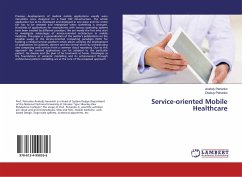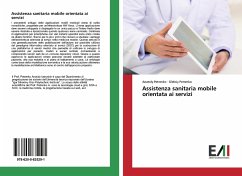Previous developments of medical mobile applications usually were monolithic ones, designed for a fixed HW infrastructure. The whole application has to be developed and deployed in one piece and the entire tier has to be retested and redeployed when something is changed. Hundreds of applications for smartphones with various operating systems have been created by different providers. We are mostly the first who start to investigate advantages of service-oriented architecture in mobile medicine. This paper is a generalization of the author's publications on the possible usage of the service-oriented computing paradigm (SOC) for building a medical services platform which allows unifying the development of applications for patients, doctors and the central server by orchestrating and composing web services from a common cloud repository. Due to this approach the created applications can be adapted to the particular patient, his disease and the plan of his treatment at home. Ontologies as the foundations of semantic modelling and its enhancement through architectural pattern modelling are at the core of the proposed approach.
Bitte wählen Sie Ihr Anliegen aus.
Rechnungen
Retourenschein anfordern
Bestellstatus
Storno








